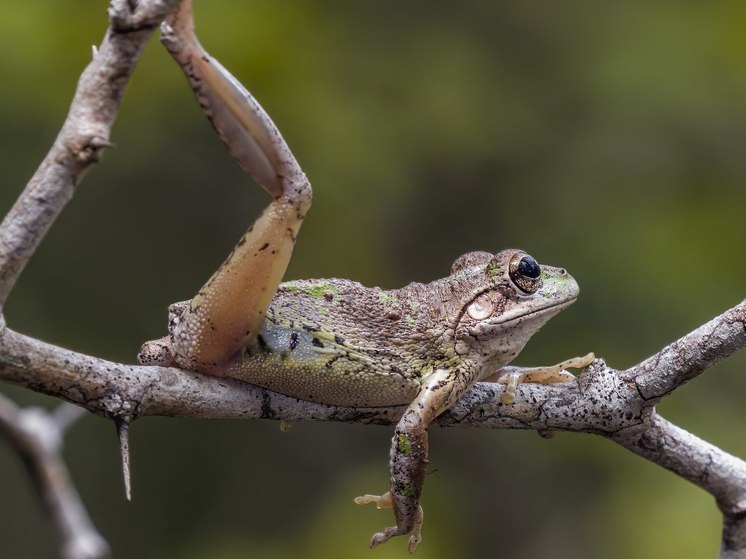Amphibians invading the US release an irritating liquid from their skin when touched
Cannibal tree frogs are invading the US: palm-sized amphibians from Cuba were spotted in Georgia – and officials are urging residents to «kill them» on the spot. This tropical invasive frog «can quickly grow to be the size of your palm,» biologists say.

Officials are calling for local killings of cannibalistic tree frogs native to Cuba that are invading parts of the United States. According to the Daily Mail, this warning is due to the fact that frogs the size of a human palm are eating frogs found in North America, which threatens to lead to «environmental problems.»
The invasive creature also «highlights irritating fluid from one's skin when touched,» consequences for humans or small animals that «remain poorly understood.»
Wildlife managers are still unsure how far north this tropical cannibal frog, which migrated through Florida from Cuba, the Cayman Islands and the Bahamas, will spread.
State biologists believe some Cuban tree frogs got there by «hitchhiking» to Chattanooga, Tennessee, and are quickly strategizing how to survive the winter.
"One thing they learned to use – according to a Georgia Department of Natural Resources Division of Wildlife biologist, – this is what we build our houses from.
"They are known to hide in transformer boxes", – said senior wildlife biologist Daniel Sollenberger, who specializes in herpetology, or the study of reptiles and amphibians. "Electrical boxes are warmer due to electrical resistance", – a scientist explained to the Augusta Chronicle about how tree frogs seek shelter from the cold.
The only known "breeding population" Georgia's Cuban tree frogs are located on Jekyll Island, a coastal state park 50 miles north of Florida.
And the Georgia Jekyll Island Authority, the governing body charged with managing Jekyll Island State Park, urged visitors to help Keep an eye out for the Cuban tree frog through your hotline.
But according to Sollenberger, cannibalistic tree frogs have proven their ability to migrate, particularly by hiding in shipments of houseplants and vegetation sold for landscaping purposes.
"They are transported on vehicles or in nurseries, – Sollenberger said. – For example, if you go to a nursery store and buy a tree, and if that tree comes from a nursery in Florida, there might be a Cuban tree frog on it.»
A senior wildlife biologist told local reporters that residents of other coastal cities such as Brunswick and Savannah, Georgia, have witnessed man-eating frogs breeding in ponds and ditches, but it is unclear whether the frogs will creep west.
"We don't know how far inland they could have gone, – Sollenberger said, – because they're kind of tropical.»
While the omnivorous meat diet of the Cuban tree frog – this is something she shares with all other frogs; her interest in eating her own kind is rare and, in part, a testament to her large size as an adult.
"They will eat a lot of insects, – says Sollenberger. – But they will also eat anything that fits into their mouth. They will even eat small tree frogs.»
"There is at least some anecdotal evidence from Florida,&rdash; he added, – that they could actually reduce the population of native frogs. If we want to keep some native fauna in our yards, this could be a problem.»
James Stroud, assistant professor of biology at Georgia Tech, told DailyMail.com he agrees that these concerns are justified.
"In Louisiana, where they were first reported as invasive in 2017, – notes Stroud, – It appears that native frogs are subsequently disappearing from these areas. This may be due to either predation or competition with invasive Cuban tree frogs.»
«Cuban tree frogs may pose a new ecological threat to protected insect species in Georgia,» – stresses Stroud.
"Cuban tree frogs are also capable of secreting an irritating liquid from their skin when touched, – he told DailyMail.com. – Although this substance is not known to be toxic to humans or small animals, the broader environmental implications in the new environment remain poorly understood.»























































Свежие комментарии